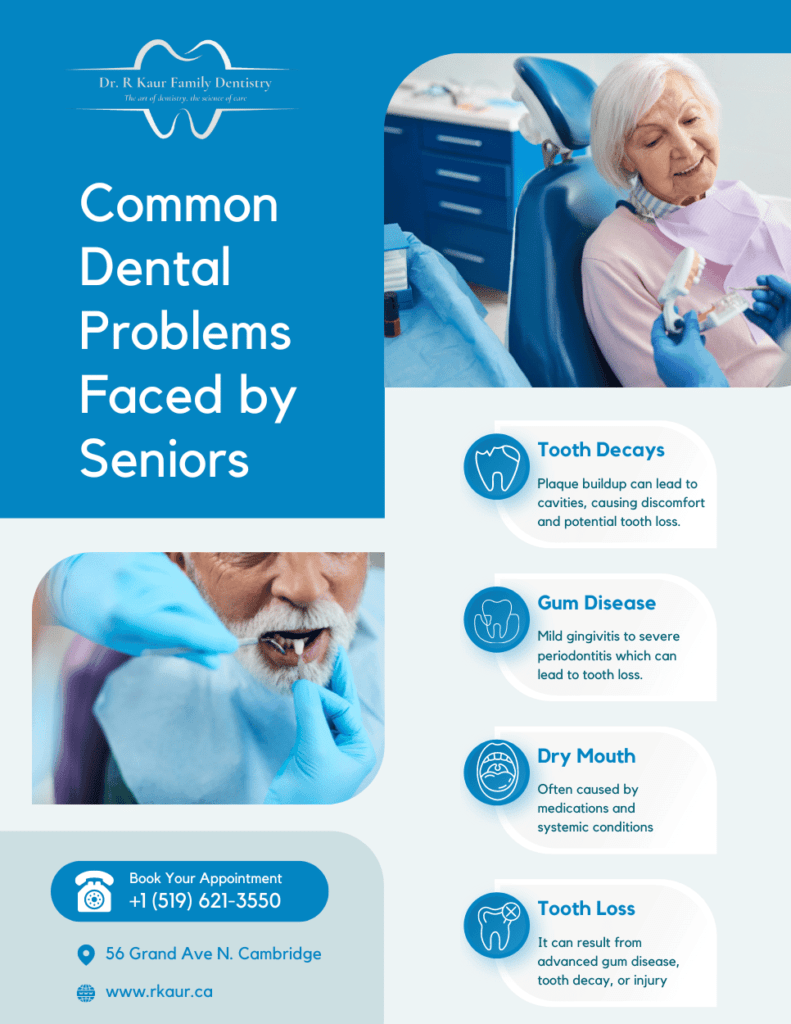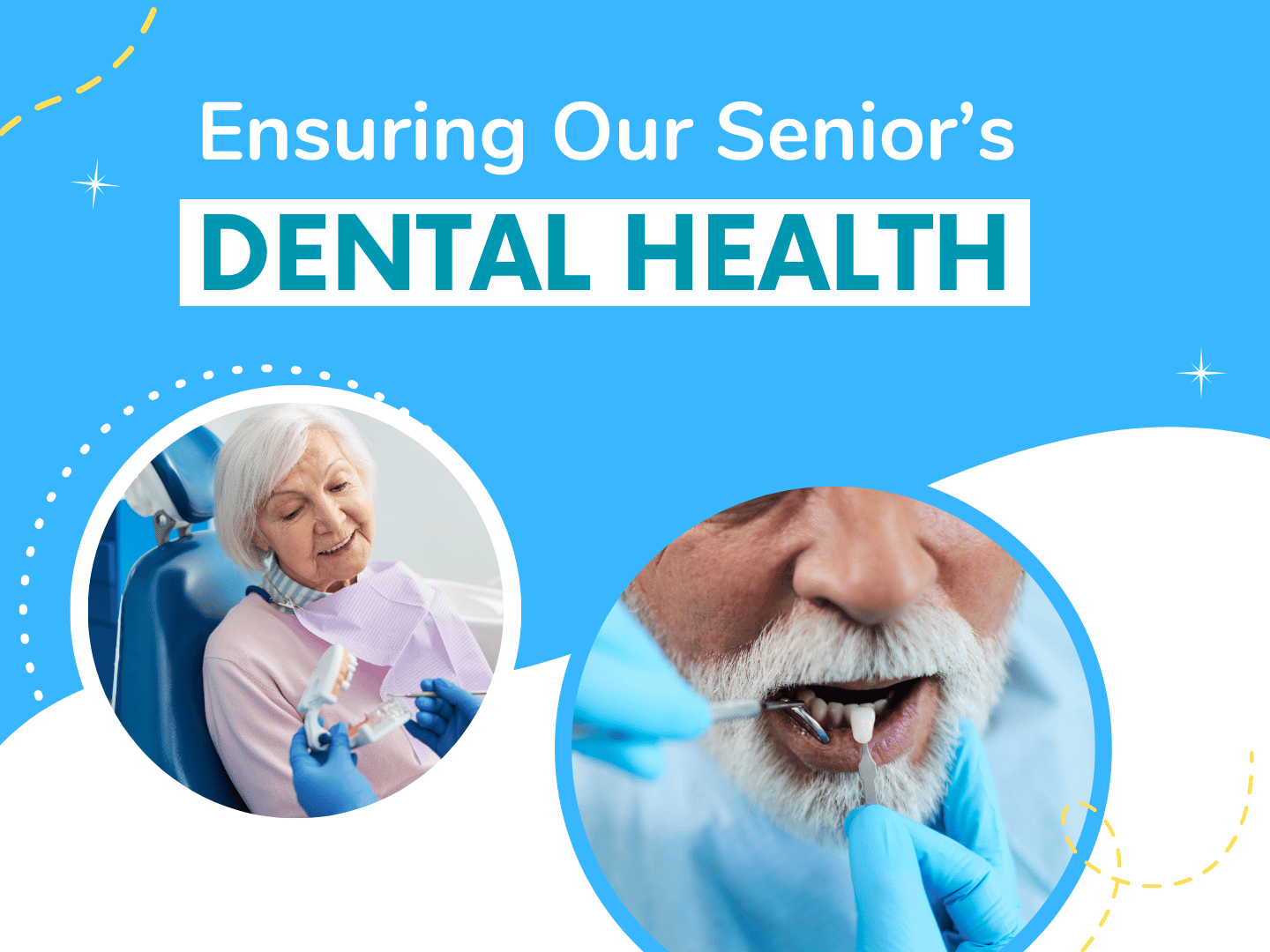As we age, maintaining oral health becomes increasingly critical. For seniors in Canada, dental problems can significantly impact overall well-being and quality of life. This comprehensive guide delves into the common dental issues faced by seniors and offers practical solutions to ensure they receive the best dental care.
Common Dental Problems Faced by Seniors
1. Tooth Decay and Cavities
Tooth decay is prevalent among seniors due to factors like dry mouth, receding gums, and changes in diet. Plaque buildup can lead to cavities, causing discomfort and potential tooth loss.
Prevention and Treatment:
Regular Dental Checkups: Bi-annual visits to the dentist for cleaning and examination.
Fluoride Treatments: Professional fluoride applications and using fluoride toothpaste.
Proper Oral Hygiene: Brushing twice a day and flossing daily.
2. Gum Disease (Periodontitis)
Gum disease ranges from mild gingivitis to severe periodontitis, which can lead to tooth loss and affect overall health.
Prevention and Treatment:
Professional Cleanings: Regular deep cleanings to remove plaque and tartar.
Good Oral Hygiene: Consistent brushing and flossing to maintain gum health.
Healthy Diet: Balanced nutrition to support immune function and oral health.
3. Dry Mouth (Xerostomia)
Dry mouth is common in seniors, often caused by medications and systemic conditions. It increases the risk of tooth decay and gum disease.
Prevention and Treatment:
Hydration: Drinking plenty of water throughout the day.
Saliva Substitutes: Using over-the-counter saliva substitutes and mouthwashes.
Medication Review: Consulting with healthcare providers to adjust medications that contribute to dry mouth.
4. Tooth Loss
Tooth loss affects chewing, speech, and self-esteem. It can result from advanced gum disease, tooth decay, or injury.
Prevention and Treatment:
Dentures and Implants: Options like complete or partial dentures and dental implants.
Maintaining Oral Hygiene: Proper care of remaining teeth and dental prosthetics.Regular Dental Visits: Continuous monitoring and maintenance by a dentist.

Ensuring the Best Dental Care for Seniors
1. Choosing the Right Dentist
Finding a dentist experienced in geriatric dental care is essential. Look for practices that offer comprehensive services and have a good understanding of the unique needs of seniors.
2. Personalized Dental Care Plans
Customized care plans should address individual dental needs, medical conditions, and personal preferences. This may include specialized treatments and preventive measures tailored to the elder’s health status.
3. Dentures: Types and Care
Dentures are a common solution for tooth loss among seniors. Understanding the types and proper care of dentures is crucial for maintaining oral health.
Following are the types of Dentures used according to the situation and specific requirements.
Types of Dentures:
Complete Dentures: Used when all teeth are missing.
Partial Dentures: Used when some natural teeth remain.
Implant-Supported Dentures: Offer increased stability and comfort.
Denture Care:
Denture care is essential for the long-term and ideal functionality of the dentures.
Cleaning: Daily cleaning with a denture brush and non-abrasive cleaner.
Soaking: Soaking dentures overnight in a denture solution.
Regular Checkups: Regular dental visits to adjust and check the fit of dentures.
4. Dental Implants: Benefits and Maintenance
Dental implants are a permanent solution for tooth loss, offering a natural look and feel.
Benefits of Dental Implants:
Aesthetics: Natural appearance that blends with existing teeth.
Durability: Long-lasting and stable.
Functionality: Improved chewing and speaking abilities.
Maintenance of Dental Implants:
Oral Hygiene: Regular brushing and flossing around the implant.
Professional Cleanings: Regular visits to the dentist for professional cleanings and checkups.
Monitoring: Regular monitoring for any signs of complications.
5. Financial Assistance and Insurance
Understanding dental insurance options and exploring financial assistance programs can help manage costs. In Canada, seniors may benefit from various provincial programs that offer dental coverage.
The Canadian Dental Care Plan (CDCP) ++ will help ease financial barriers to accessing oral health care for eligible Canadian residents specially tailored for taking dental care of our seniors.
6. Education and Awareness
Educating seniors and caregivers about the importance of oral health is crucial. Providing resources on proper dental hygiene practices and the significance of regular dental visits can empower seniors to maintain their oral health.
7. Nutritional Support
A balanced diet rich in vitamins and minerals supports dental health. Seniors should be encouraged to consume foods that promote strong teeth and gums, such as dairy products, leafy greens, and lean proteins.
Conclusion
Maintaining dental health is a vital aspect of overall health for seniors. By understanding the common dental problems they face and implementing effective preventive and treatment strategies, we can ensure that elders in Canada enjoy optimal oral health. Regular dental visits, personalized care, and proper education are key to achieving this goal.
Reach out to us for a free consultation for personalized care for you or your senior family members.

